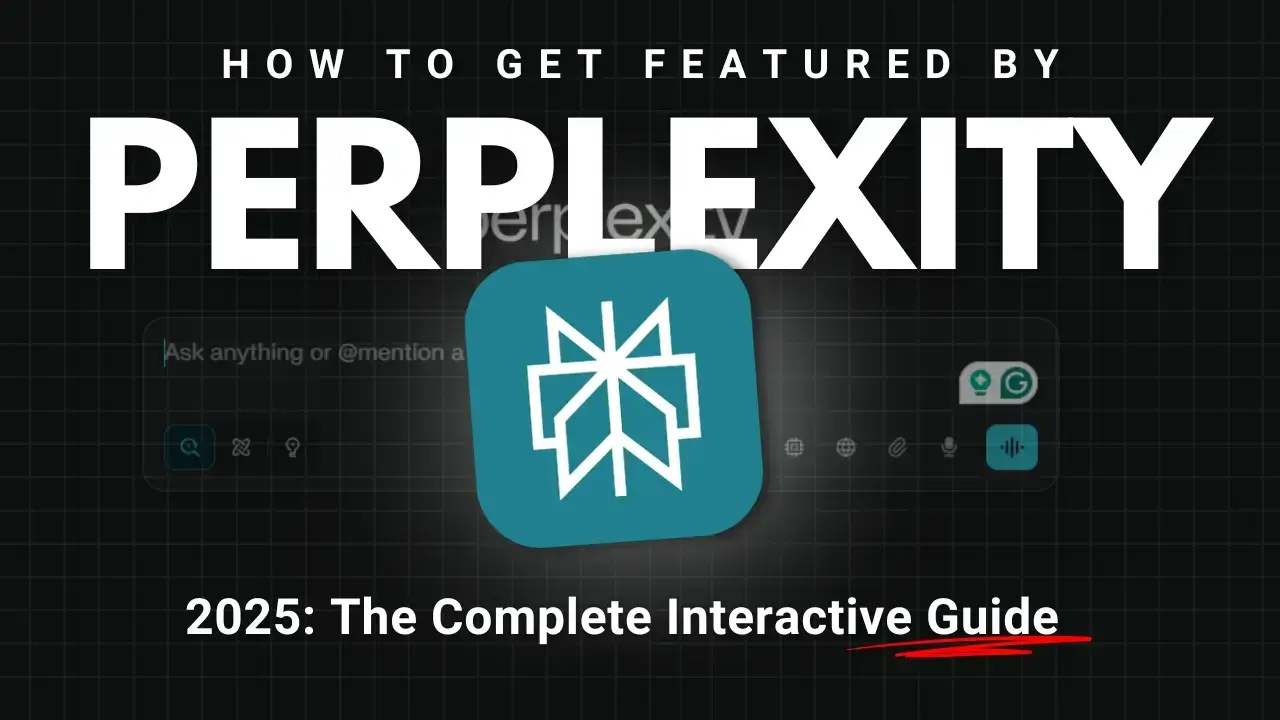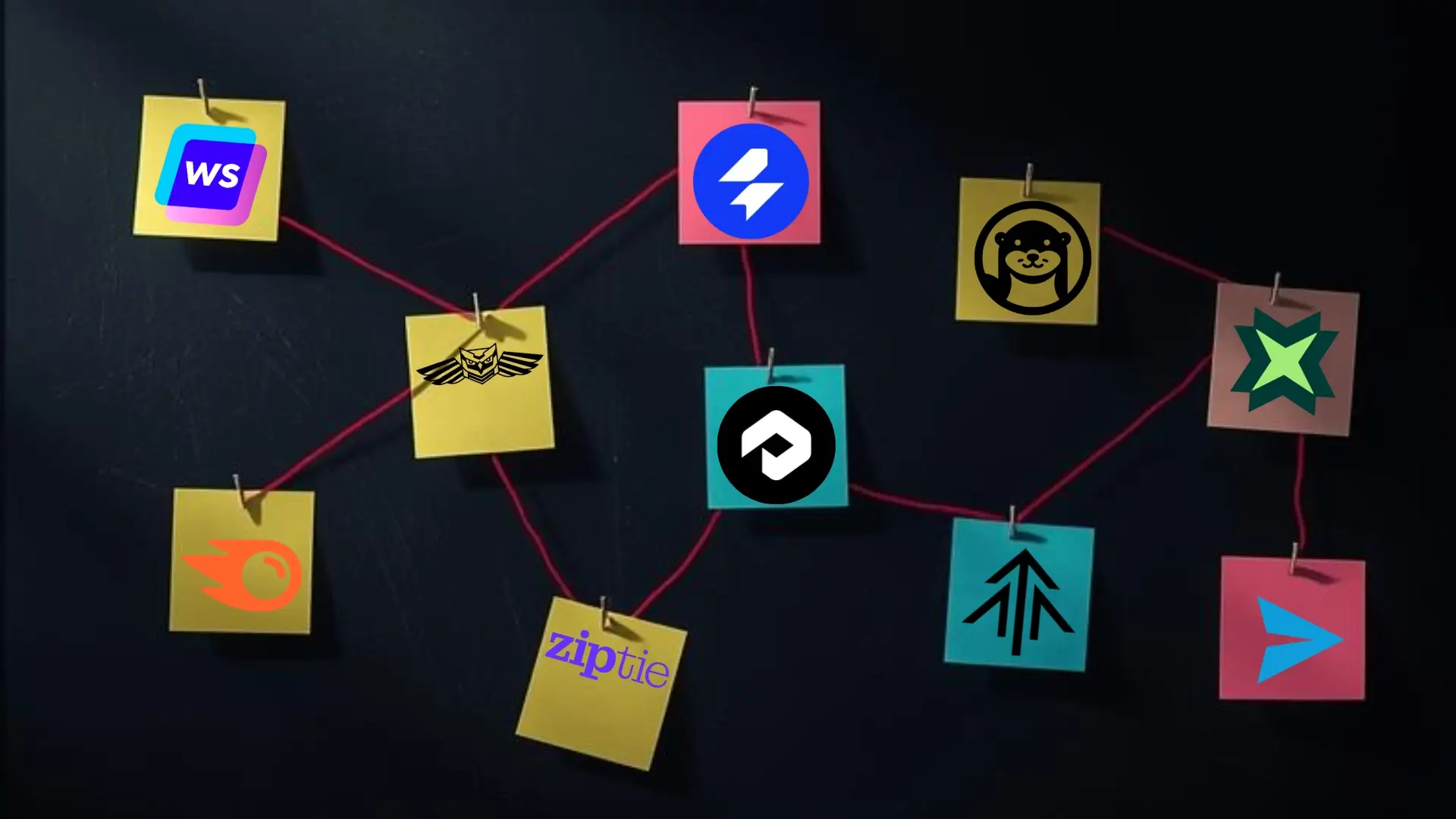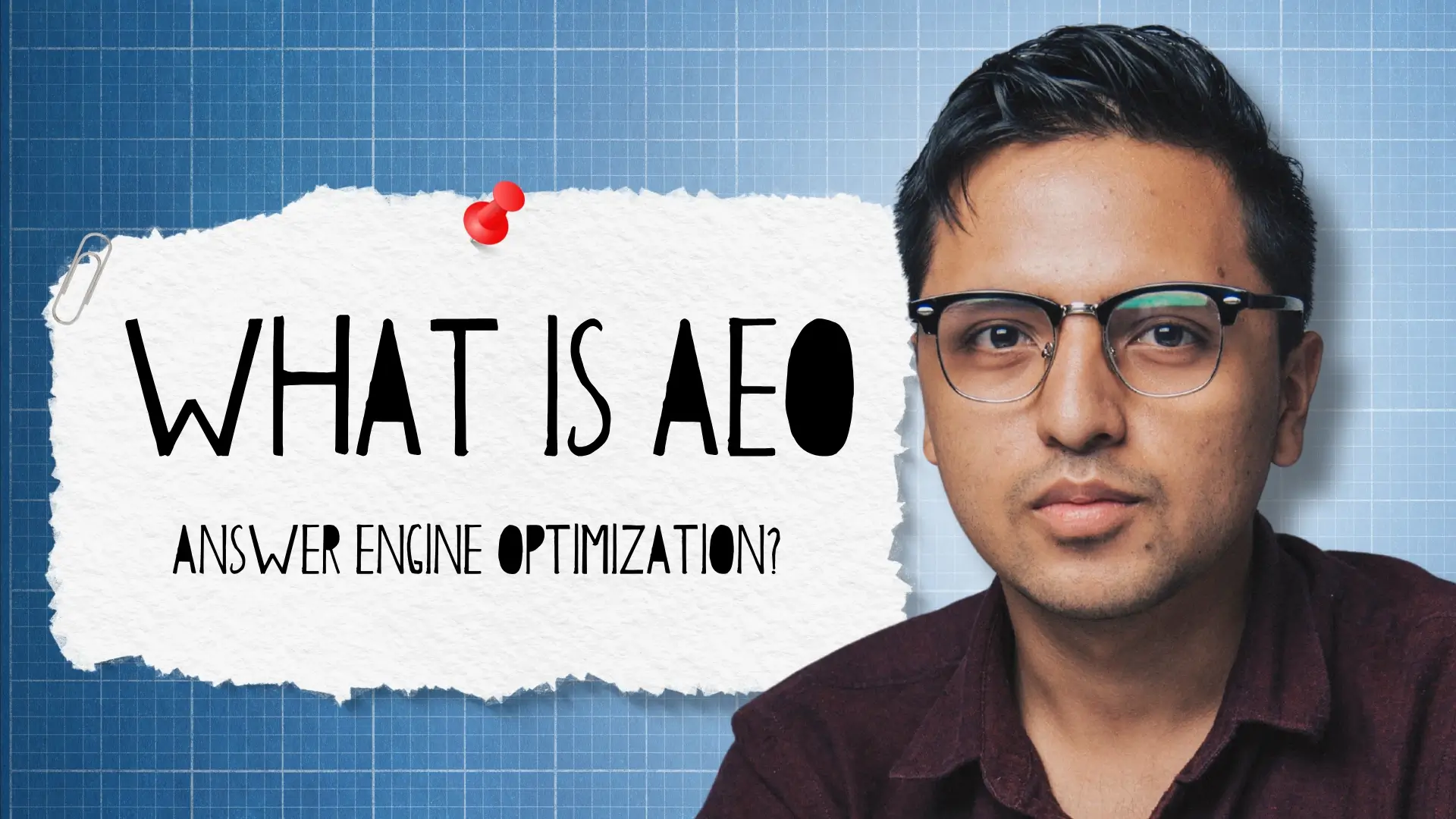Simplify the AI Maze with Answer Engine Optimization Tools
Raise your hand if you’ve ever:
- Wasted hours tweaking SEO, only to watch Google’s AI Overviews bury your content.
- Panicked as competitors hijacked ChatGPT answers while your brand vanished.
- Wondered if “AEO tools” are just SEO tools with a ChatGPT sticker slapped on.
If any of that feels familiar, you’re not alone. Welcome to the era of,Answer Engine Optimization (AEO) where “ranking” isn’t enough. Today, the real fight is for ownership of AI-generated answers across platforms like ChatGPT, Claude, and Google AI Overviews.
Think of AEO tools as your compass through the AI maze. They don’t just track keywords; they track how your brand appears in AI answers, recommendations, and summaries, helping you reclaim visibility before your competitors do.
In this guide, we’ll explore the top AEO tools of 2025, how they work, and why they’ve become essential for brands navigating the AI-driven search revolution.
What Are Answer Engine Optimization (AEO) Tools?
Answer Engine Optimization (AEO) tools are your brand’s AI whisperers specialized software designed to optimize content visibility across AI-driven platforms like ChatGPT, Google AI Overviews, Perplexity, Claude, and Microsoft Copilot. Unlike traditional SEO tools that focus on ranking for keywords, AEO tools focus on teaching AI engines how to talk about your brand.
Here’s what makes them different:
- Decode AI Preferences → Understand why Gemini, ChatGPT, or Perplexity prefer citing your competitors instead of you.
- Track Sentiment → Spot when Claude calls your software “buggy” instead of “best-in-class.
- Dominate Zero-Click Answers → With 77% of queries ending with AI-generated responses (BrightEdge, 2024), AEO tools help ensure your brand is included in those final answers.
Think of AEO tools as your brand’s AI publicist; they make sure when robots speak, they speak your story.
How to Evaluate AEO Tools: 3 Non-Negotiables
Not all AEO tools are built the same. While many promise to boost your AI visibility, only a handful are truly equipped to handle the complexity of modern AI-driven search. Before investing, make sure your tool checks these three non-negotiable boxes:
AI Platform Coverage (Beyond Google)
If your AEO tool only optimizes for Google AI Overviews, you’re already behind. In 2025, AI-driven discovery happens everywhere on ChatGPT, Perplexity, Claude, Microsoft Copilot, and more.
A strong AEO tool should:
- Monitor brand mentions across multiple AI platforms
- Track how your competitors are being cited
- Surface visibility gaps in real time
Example: AI Monitor instantly alerts you when Perplexity.ai misquotes your pricing so you can fix it before it spreads.
Sentiment & Context Intelligence
Being mentioned isn’t enough; the tone matters. If Perplexity lists your product but calls it “outdated”, that’s a missed opportunity. Similarly, if users are asking Gemini why your delivery times “suck”, you need to catch and address that before AI engines shape your brand narrative. The best AEO tools don’t just track what’s said; they analyze how it’s said. Look for:
- AI sentiment tracking → Positive vs. negative mentions
- Narrative control → Which key phrases, features, or reviews are AI engines highlighting
- Competitive positioning → Whether you’re labeled “market leader” or “budget alternative”
Pro Tip: Prioritise tools that provide context-rich sentiment dashboards so you know when to celebrate or intervene.
AI Training Integrations (The Next Frontier)
Most AEO tools track what AI engines say about you, but the real game-changers influence what they say. This is where AI training integrations come in.
Instead of static reports like:
“Your FAQ ranked #8 in ChatGPT last month.”
…the next generation of AEO tools goes further. They feed structured, AI-friendly content directly into the ecosystem, helping engines learn your preferred narrative and cite your brand more often.
What elite tools do:
- Leverage live prompt trends → Analyze real-time user queries and generate content briefs optimized for AI engines.
- Push structured data to AI systems → Ensuring your product specs, FAQs, and pricing are easily digestible for LLMs.
- Shape AI outputs at the source → Aligning your messaging with what AI engines highlight in their summaries.
Example: Tools like Profound automatically create AI-ready content briefs based on emerging prompt trends, giving your content the best chance of being cited in ChatGPT, Perplexity, and Gemini responses.
Pro Tip:Look for AEO tools that don’t just report rankings but actively help you train AI engines to favor your content.
Bottom Line
If an AEO tool can’t track, analyze, and influence your brand’s visibility across multi-platform AI ecosystems, it’s not built for 2025. These three non-negotiables separate tools that generate insights from those that actually deliver AI dominance.
List of Top 10 Answer Engine Optimization Tools
AI Monitor
Real-time brand visibility tracking
ChatGPT, Google AI Overviews, Perplexity, Claude, Copilot
Profound
AI prompt trend analysis + content briefs
ChatGPT, Gemini, Claude, Perplexity
Semrush
Hybrid SEO + early-stage AEO
Google AI Overviews, Bing Copilot
WriteSonic
AI-driven content creation
ChatGPT, Gemini, Claude
Otterly.AI
Optimizes transcripts & meetings for AI visibility
ChatGPT, Copilot, Gemini
SERanking
SEO + AEO tracking hybrid
Google AI Overviews, basic ChatGPT integration
RankScale
Brand positioning inside AI ecosystems
ChatGPT, Perplexity, Gemini, Claude
BrandRank.ai
AI sentiment & brand positioning
ChatGPT, Gemini, Copilot
Nightwatch
GEO-focused SEO tracking
Google AI Overviews, ChatGPT, You.com
Ziptie.dev
AI schema + structured data feeds
Google AI Overviews, AI scrapers, ChatGPT
Legend:
- ✅Strong capability
- ⚠️Limited or partial capability
- ❌Minimal or missing capability
Top 10 Answer Engine Optimization Tools to Dominate AI Search: A Comprehensive Guide
Spoiler: #1 Takes the Crown, But Everyone Deserves a Spotlight
The rise of Answer Engine Optimization (AEO) is transforming how brands compete in AI-driven search. To help you stay ahead, we’ve analyzed the top 10 AEO tools, evaluating their features, pricing, and ROI. Let’s explore the contenders.
AI Monitor — # 1 AEO Tool
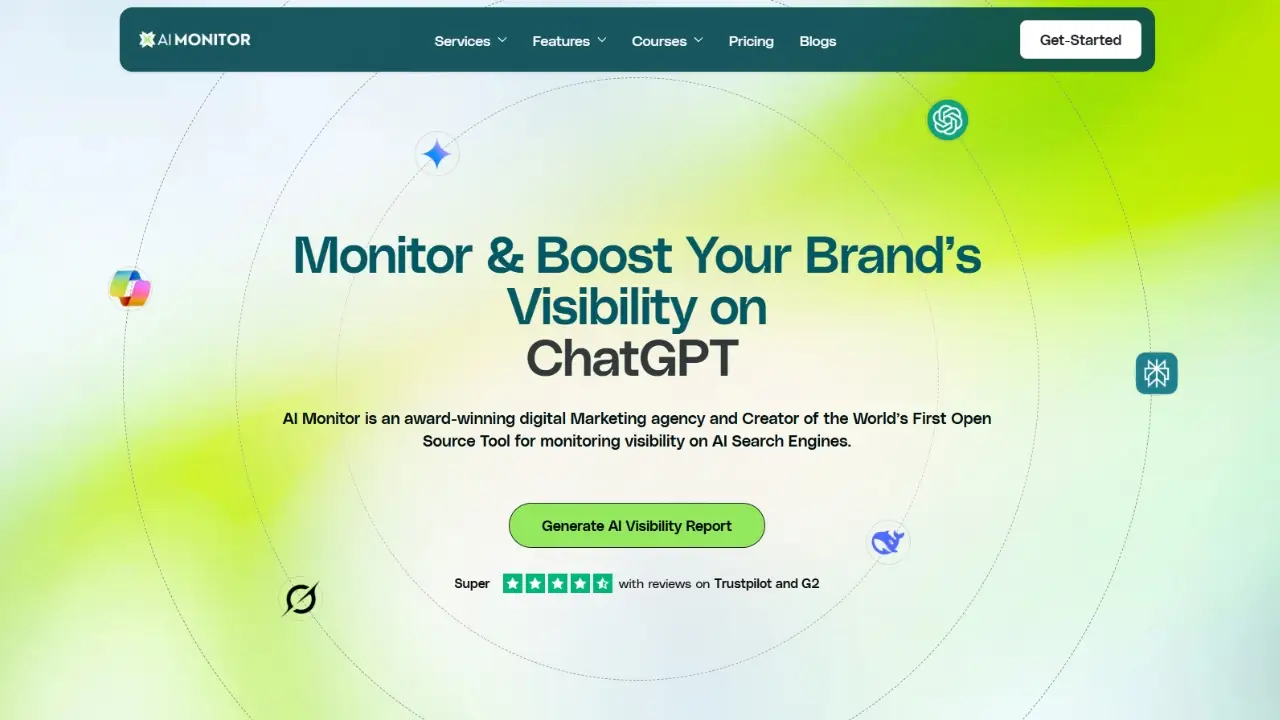
"Unmatched Results That Speak for Themselves"
AI Monitor is the #1 Answer Engine Optimization (AEO) tool for B2B SaaS companies, digital marketing agencies, and startups. Built with a GEO-first (Generative Engine Optimization) approach, it helps you track how AI engines perceive, cite, and summarize your brand across platforms like ChatGPT, Google Gemini, Perplexity, Claude, and Microsoft Copilot.From real-time sentiment tracking to competitive benchmarking, it ensures your brand stays visible, relevant, and accurately represented in AI-generated answers.
Best For
- Startups, brands, and agencies want multi-platform AI visibility
- Marketers seeking actionable insights into AI-driven responses
- SEO teams are adapting to the shift from search engines to answer engines
Key Features
- Multi-Platform AI Tracking → Monitor brand mentions across ChatGPT, Gemini, Perplexity, Claude, Copilot, and others in real-time.
- Sentiment & Narrative Analysis → See if AI engines describe you as “best-in-class” or “outdated.”
- AI Prompt Volume Tracking → Understand what users are asking in your niche and optimize accordingly.
- Competitor Benchmarking → Compare your visibility vs. competitors’ mentions in AI answers.
- AI Traffic Analytics → Identify which blogs, pages, or assets are driving citations in AI summaries.
Pros & Cons
| Pros ✅ | Cons ❌ |
|---|---|
|
|
Pros ✅
Cons ❌
Pricing
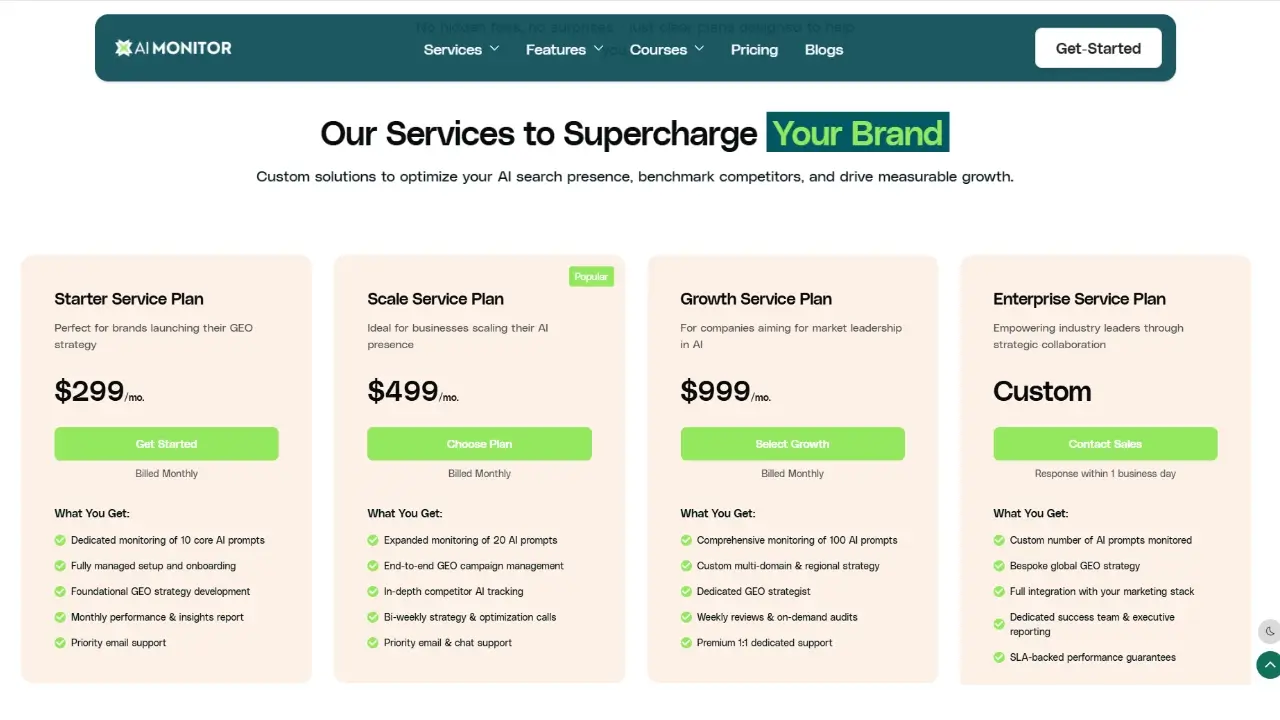
| Plan | Price | Best For |
|---|---|---|
Self host | Free Forever | Technical Founders & Hobbyists |
Starter | $19/month | Freelancers & small teams |
Growth | $99/month | Large orgs & agencies |
Enterprise | Custom | Large enterprises |
Verdict ⭐
AI Monitor is the gold standard of AEO tools. It combines real-time AI tracking, sentiment analytics, and GEO-driven insights into a single, easy-to-use dashboard. For brands serious about dominating AI-driven search and controlling their narrative, this is the go-to tool.
ROI Potential: High brands report up to 500% visibility growth.
ROI Rating: ★★★★☆ (4.5/5)
Overall Rating: ⭐⭐⭐⭐⭐ (5/5)
AI Monitor stands out as the industry leader in AI visibility tracking, offering unmatched accuracy, reporting depth, and enterprise scalability. It’s ideal for businesses that want reliable insights across ChatGPT, Perplexity, and Claude, making it a must-have for serious growth-driven brands.
Profound — The Oracle for Global Enterprises
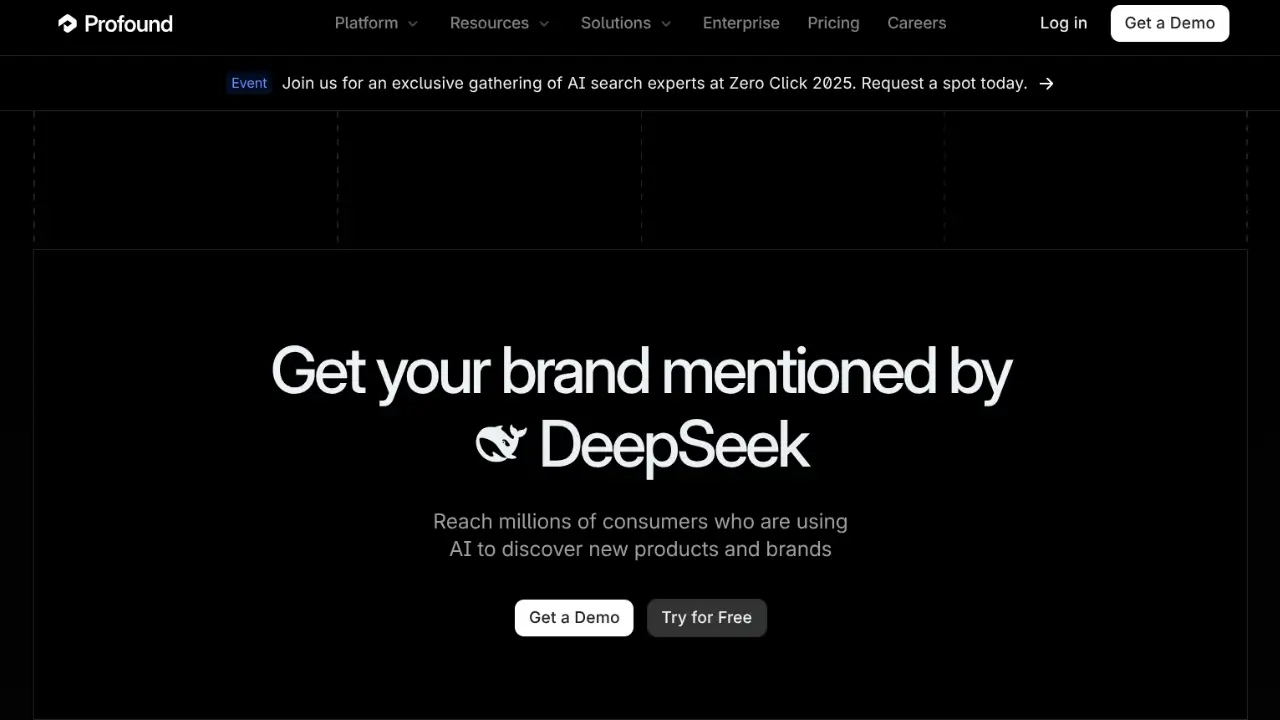
"Deep Insights at a Premium Price—Worth Every Migraine"
Profound is a premium Generative Engine Optimization (GEO) platform built for enterprise brands. It delivers real-time AI visibility analytics with predictive modeling, helping global corporations dominate brand storytelling across platforms like ChatGPT, Google AI Overviews, Perplexity, Bing Copilot, Claude, Meta AI, and more. With features like conversation trend analysis and agent-level insights, it empowers strategic decision-making at scale.
Best For
- Enterprises, global brands, and PR/marketing teams operating across multiple regions
- C-suite strategists and data science teams managing brand perception on AI platforms
- Marketing agencies overseeing AI visibility for high-stakes clients
Key Features
- Answer Engine Insights → Monitors how and how often your brand appears across major AI platforms
- Agent Analytics → Tracks how AI bots crawl, interpret, and attribute content from your site
- Conversation Explorer → Analyzes millions of AI-user interactions to uncover trends and audit visibility gaps
- Shopping Dashboard → Monitors how your products surface in ChatGPT Shopping, highlighting visibility, triggers, and performance
- Predictive Modeling & Volume Trends → Forecasts emerging AI conversation trends so you can stay ahead
Pros & Cons
| Pros ✅ | Cons ❌ |
|---|---|
|
|
Pros ✅
Cons ❌
Pricing
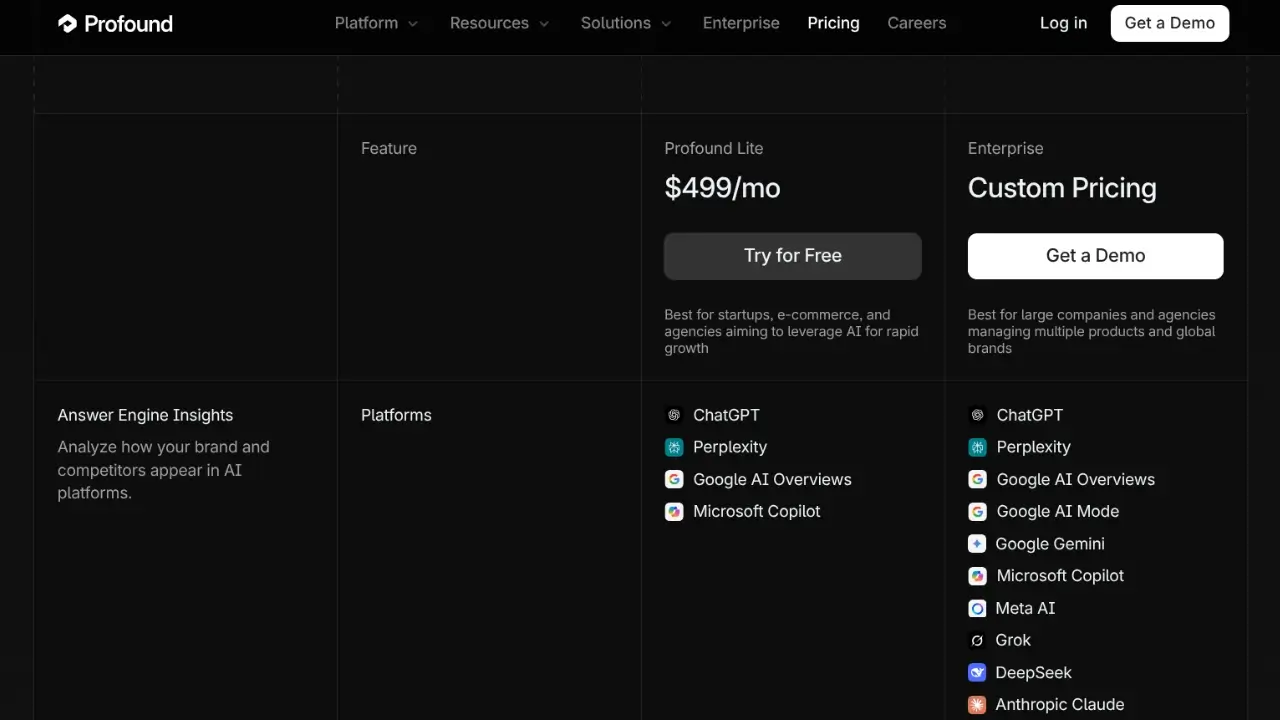
Verdict ⭐
Profound stands as an enterprise-grade powerhouse for AI visibility and brand control. Its combination of visibility tracking, agent intelligence, and predictive trend analysis gives global brands a commanding edge. Just be prepared for the cost, complexity, and technical ramp-up. It's built for scale, not simplicity.
ROI Potential: High for enterprises with the infrastructure and budget to leverage deep insights meaningfully.
ROI Rating: ★★★★☆ (4.0/5)
Overall Rating: ⭐⭐⭐⭐ (4/5)
Semrush — The Veteran Adapting to the AI Era
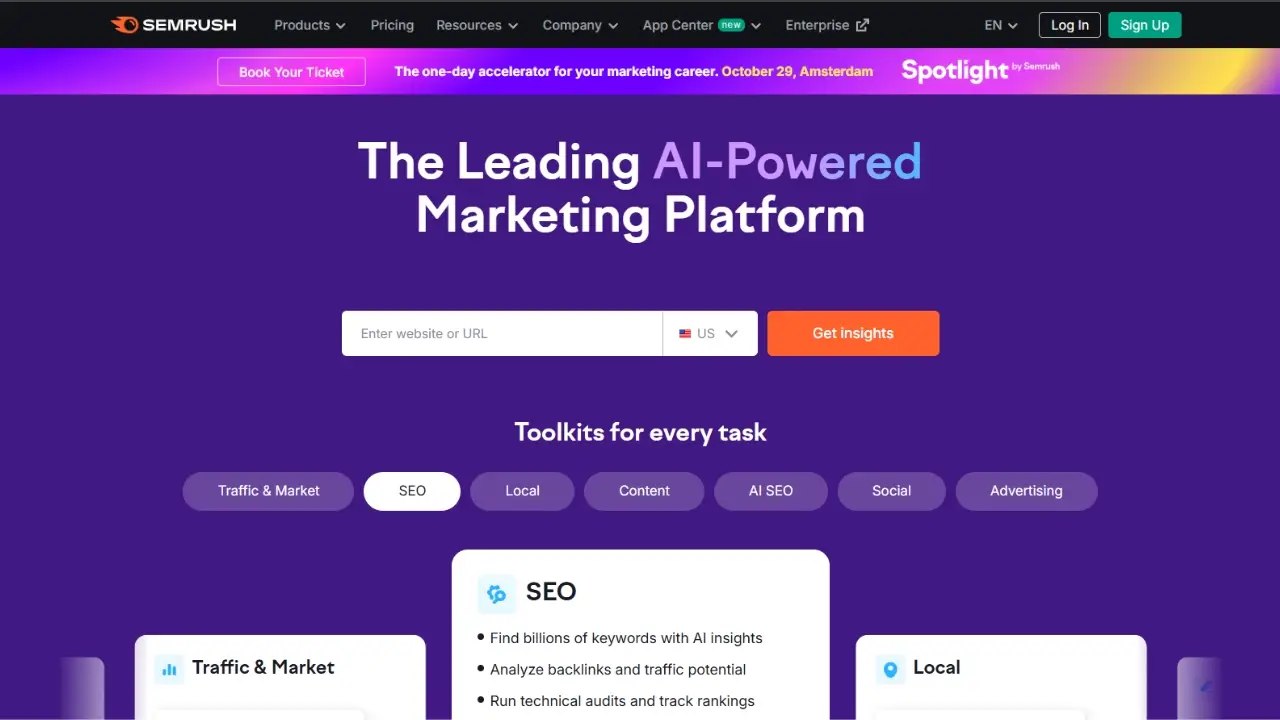
"Broad Insights, But Lacks Precision"
Semrush has long been a stalwart in the SEO toolkit. In the AI-focused world of Answer Engine Optimization (AEO), it now offers emerging capabilities but stops short of full AI visibility mastery. Let’s break down its positioning in the evolving SEO-to-AEO landscape.
Semrush retains its roots in traditional SEO while gradually integrating AI-driven insights. Its AI SEO Toolkit allows marketers to monitor AI-generated answers such as Google AI Overviews and ChatGPT responses from a high-level perspective, without deep dive granularity.
Best For
- Entry-level AEO users and SEO teams wanting a bridge to AI visibility
- Brands balancing SEO and AI strategy in a single platform
- Marketers welcome a familiar workflow with incremental AI enhancements
Key Features
- AI SEO Toolkit Visibility Overview
Monitors your AI visibility presence and identifies prompts where your brand is mentioned or missing from AI-generated responses. - Brand Performance Reports
Assesses sentiment, key brand attributes, and topics associated with your brand in AI contexts. - Prompt Tracking
Track up to 10 AI prompts per LLM (more if you have a Guru or Business plan), with daily updates. - AI Crawlability in Site Audit
Flags technical issues that hinder AI bot crawling, like missing markup or poor internal linking, so you can optimize for AI awareness. - Keyword Magic & SERP Filtering
Pros & Cons
| Pros ✅ | Cons ❌ |
|---|---|
|
|
Pros ✅
Cons ❌
Pricing
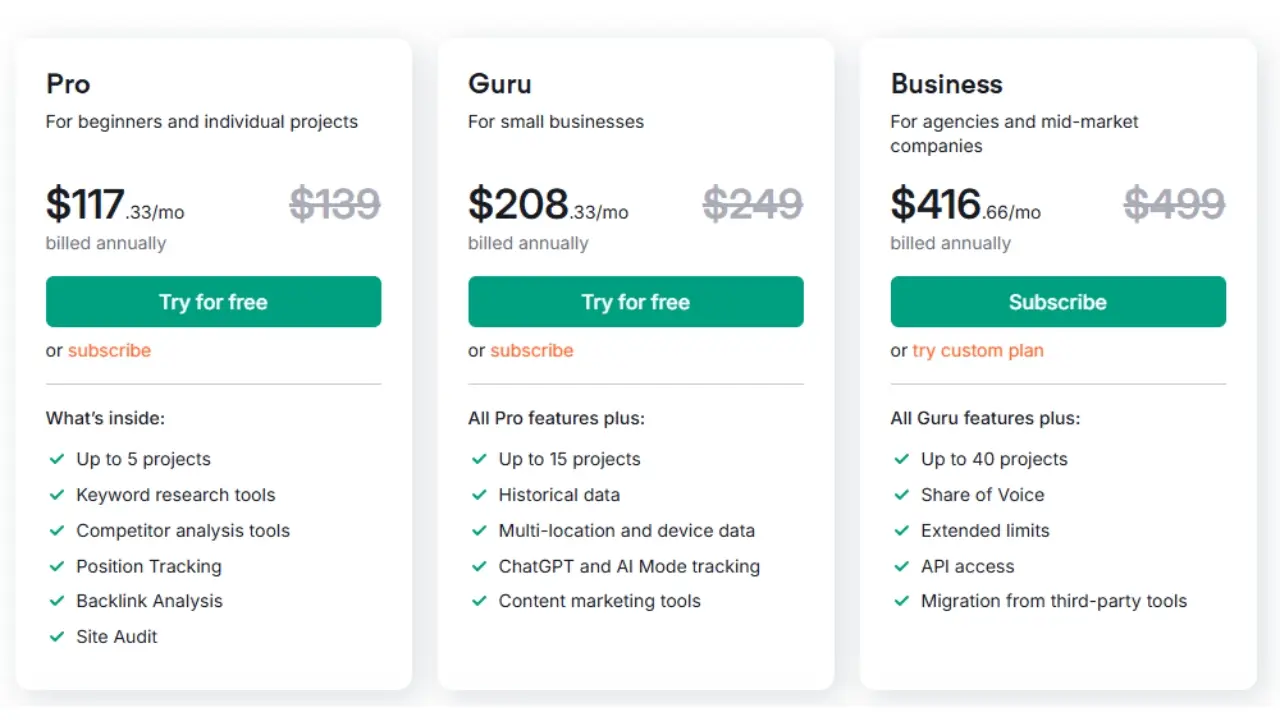
Verdict ⭐
Semrush is a solid hybrid AEO bridge for SEO teams, offering entry-level AI visibility without disrupting existing workflows. It’s budget-friendly and easy to use, but lacks the precision and depth needed for AI-first strategic dominance.
ROI Potential: Moderate for teams looking to dip their toes into AI visibility while maximizing existing SEO investments.
ROI Rating: ★★★★☆ (4.5/5)
Overall Rating: ⭐⭐⭐ (3/5)
WriteSonic — The Content Creator Mastering AI Visibility
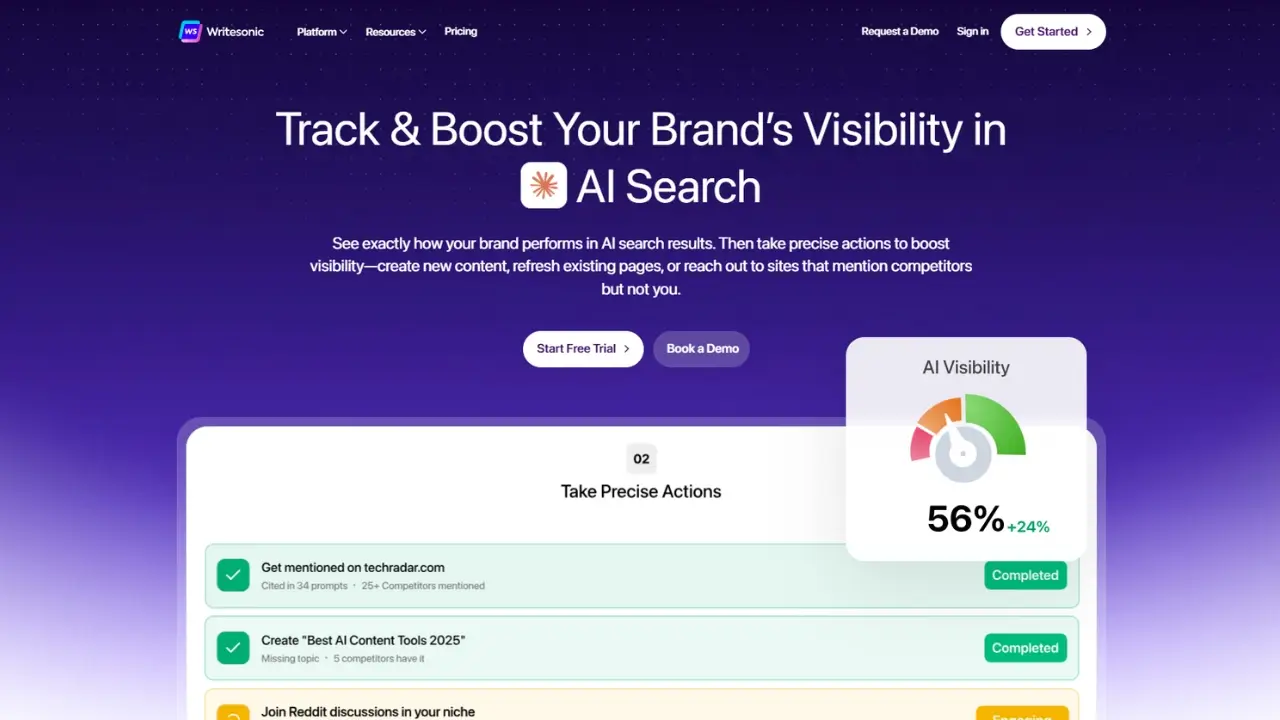
"Unified Workflow That Monitors, Optimizes, and Acts - All in One Place"
WriteSonic isn’t just an AI-powered writing assistant its GEO platform offers end-to-end brand visibility in AI search. It combines monitoring, insights, and optimization into a cohesive workflow. You’ll not only see how your brand shows up in AI responses across platforms like ChatGPT, Perplexity, Gemini, Claude, and Google AI Overviews, but also discover missed opportunities and get step-by-step guidance to fix them. With built-in SEO tools, content creation capabilities, and actionable analytics, WriteSonic often replaces multiple software tools.
Best For
- Teams centralizing AI search presence, content creation, and SEO workflows into one platform
- Marketers focused on quickly addressing AI visibility gaps with actionable fixes
- Brands looking to optimize in real-time using genuine prompt data and AI analytics
Key Features
- Monitoring Across Platforms: Tracks brand mentions, sentiment, and AI visibility across major AI engines, including ChatGPT, Google AI Overviews, Perplexity, Gemini, Grok, and more.
- Real Prompt Data: Analyzes actual AI queries from 120M+ interactions, moving beyond traditional keyword models.
- Action Center: Offers prioritized, step-by-step suggestions to fill citation gaps and improve AI visibility
- Integrated SEO & Content Toolkit: From keyword clustering to AI writing, optimization scoring, content audits, and schema generation, everything is built in
Pros & Cons
| Pros ✅ | Cons ❌ |
|---|---|
|
|
Pros ✅
Cons ❌
Pricing
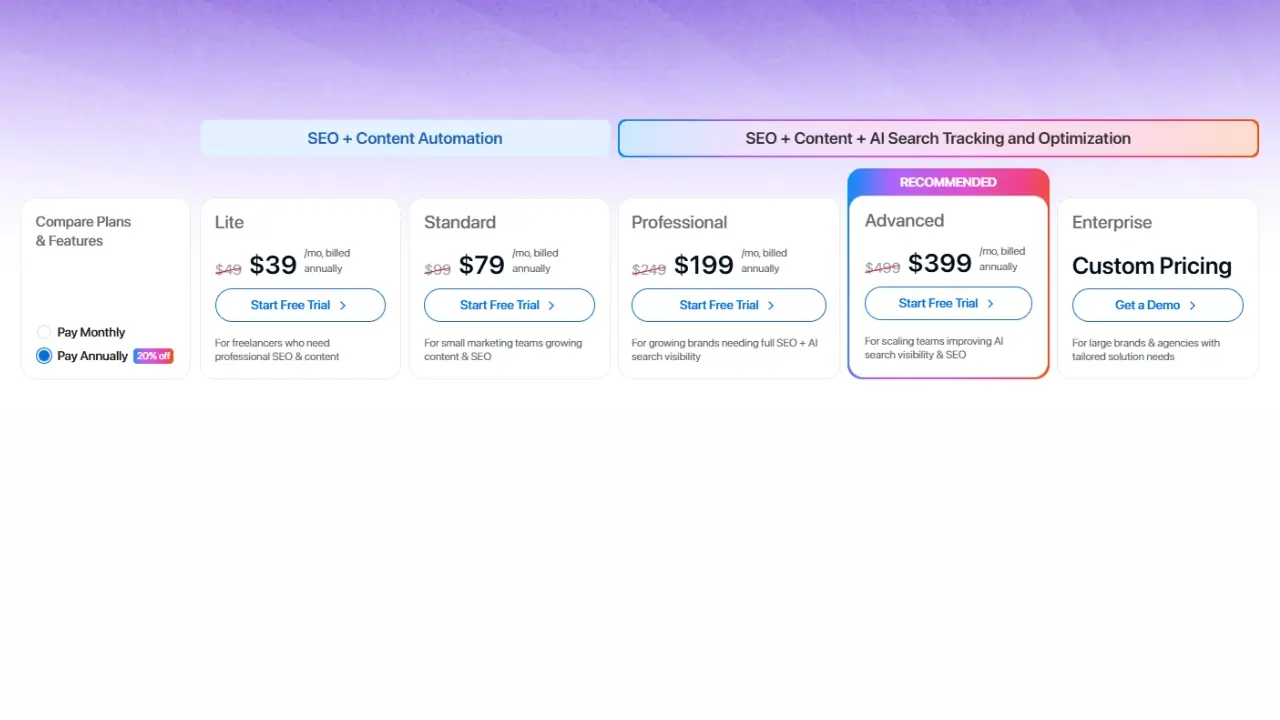
Verdict ⭐
WriteSonic offers a rare advantage: you can monitor, analyze, and optimize your brand’s presence in AI search without hopping between multiple tools. The GEO integration, coupled with content creation and SEO capabilities, delivers outstanding ROI, especially for teams scaling their AI visibility strategies.
ROI Potential: Users report significant tool cost reduction (up to 70%), more efficient workflows, and faster improvement in AI visibility and content performance.
ROI Rating: ★★★☆ ☆ (3/5)
Overall Rating: ⭐⭐⭐⭐ (4/5)
Otterly.AI – The Budget-Friendly Beginner
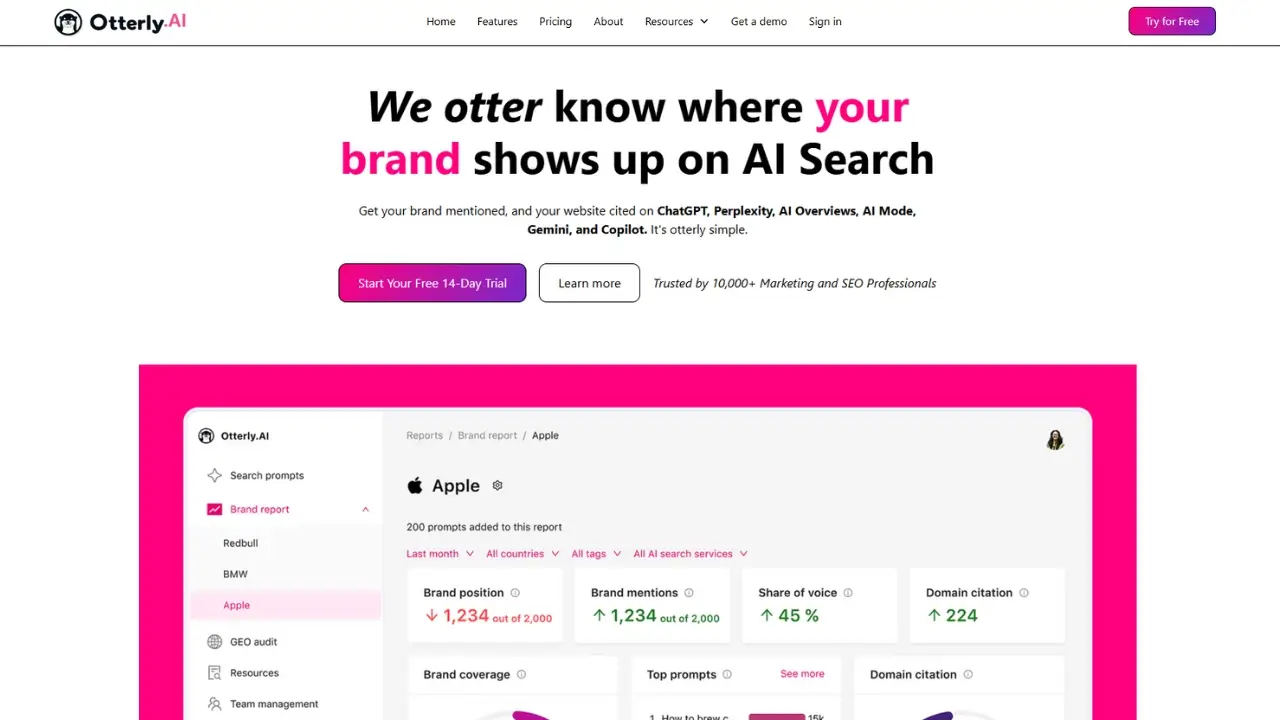
"Affordable, but Accuracy Has Its Limits"
Otterly.AI is an entry-level AEO tool designed for individuals and small teams making the transition from traditional SEO to AI-driven optimization. Unlike advanced platforms built for enterprise-scale tracking, Otterly focuses on simplicity and affordability, offering users a lightweight way to monitor AI-generated search insights. It’s particularly attractive for startups and solo marketers looking to experiment with AEO strategies without committing to high-cost solutions.
Best For
- Startups, solopreneurs, and small marketing teams.
- Marketers are shifting from SEO to AEO but need basic monitoring.
- Users who want affordable insights without diving deep into advanced analytics.
Key Features
- 1. Query Snapshots
- Generates beginner-friendly summaries of AI search engine responses.
- Ideal for quick reviews that don't require technical expertise.
- 2. Keyword-to-Prompt Conversion
- Converts traditional SEO keywords into AI-optimised prompts.
- Helps align existing SEO strategies with AI-driven content demands.
- 3. Volume & Growth Tracking
- Tracks AI prompt volume trends and growth patterns.
- Enables users to identify emerging queries and potential opportunities early.
Pros & Cons
| Pros ✅ | Cons ❌ |
|---|---|
|
|
Pros ✅
Cons ❌
Pricing
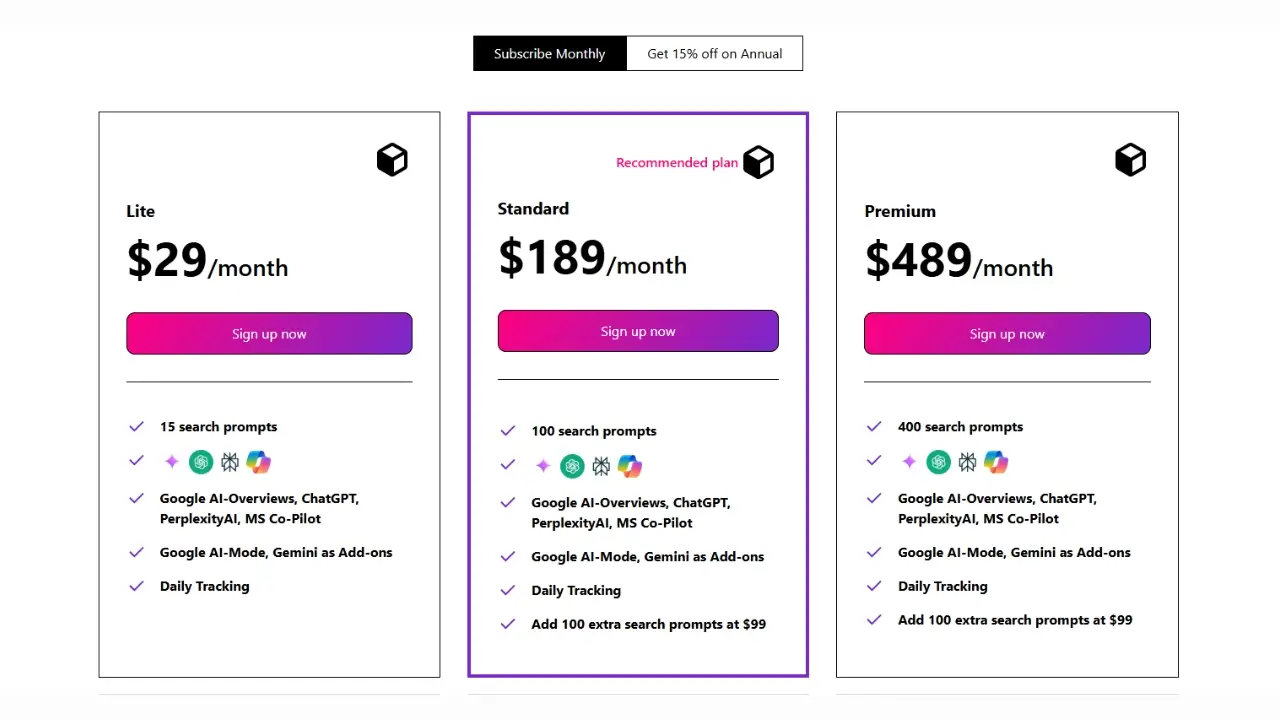
Verdict ⭐
Otterly.AI is a great beginner’s tool for brands experimenting with Answer Engine Optimization without making a heavy investment. However, businesses with serious visibility goals on platforms like ChatGPT, Google AI Overviews, Perplexity, and Claude may quickly outgrow its capabilities. As AI-driven search expands, Otterly risks falling behind unless it improves its accuracy, tracking, and integration capabilities.
ROI Potential: Otterly.AI delivers strong value for small teams but struggles to keep up with platforms like AI Monitor when it comes to data precision, reporting depth, and scalability.
ROI Rating: ★★★☆☆ (3.5/5)
Overall Rating: ⭐⭐⭐ (3/5)
SERanking – The SEO Veteran Struggling to Evolve
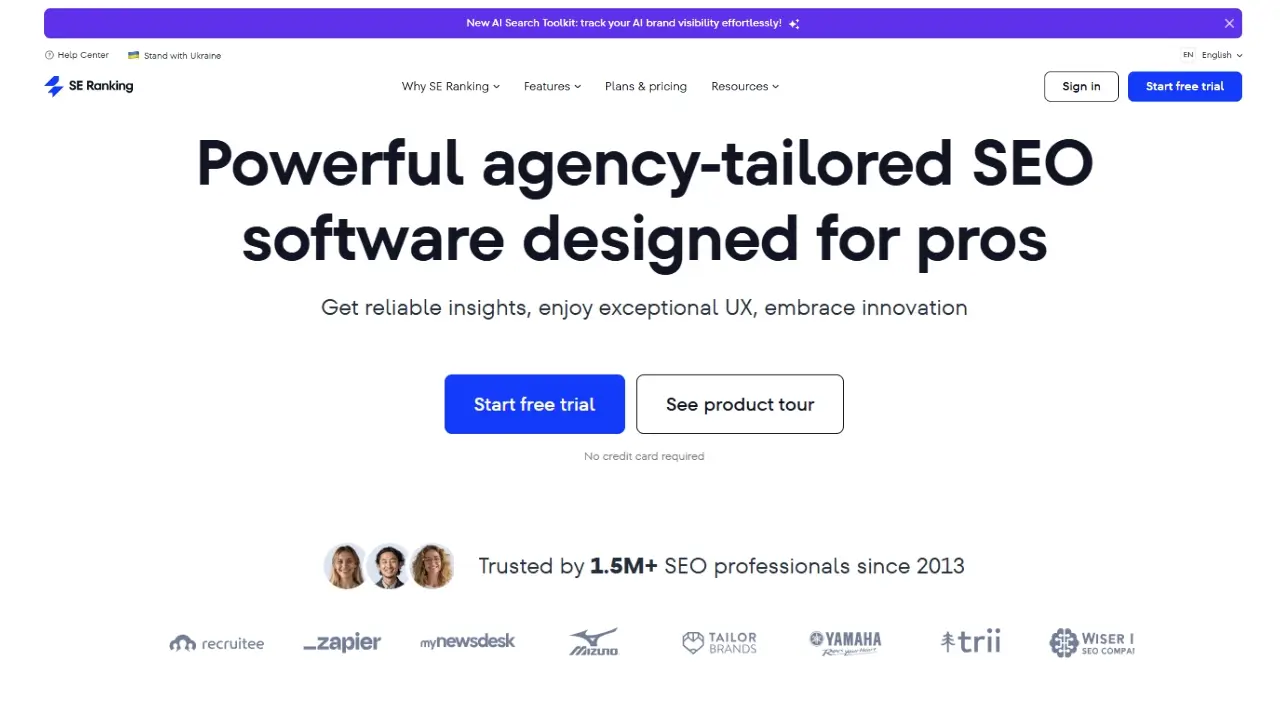
"Stuck Between Traditional SEO and Modern AEO"
SERanking has been a trusted SEO tool for years, but in today’s Answer Engine Optimization (AEO) landscape, it feels caught between two worlds. While it continues to excel at traditional SEO tasks and offers solid tracking for Google AI Overviews, it lacks the multi-platform depth and adaptability required for modern AI-driven search strategies.
Best For
- SEO teams primarily focused on Google AI Overviews rather than multi-platform tracking
- Businesses that want to retain classic SEO workflows with limited AI integration
Key Features
- Real-Time Alerts
Get timely notifications when your brand appears in Google’s AI Overviews. - Google Snippet Tracking
Precisely monitors Google AI-generated snippets for your target keywords. - Traditional SEO Reliability
Retains its core strength in rank tracking, site audits, and keyword research.
Pros & Cons
| Pros ✅ | Cons ❌ |
|---|---|
|
|
Pros ✅
Cons ❌
Pricing
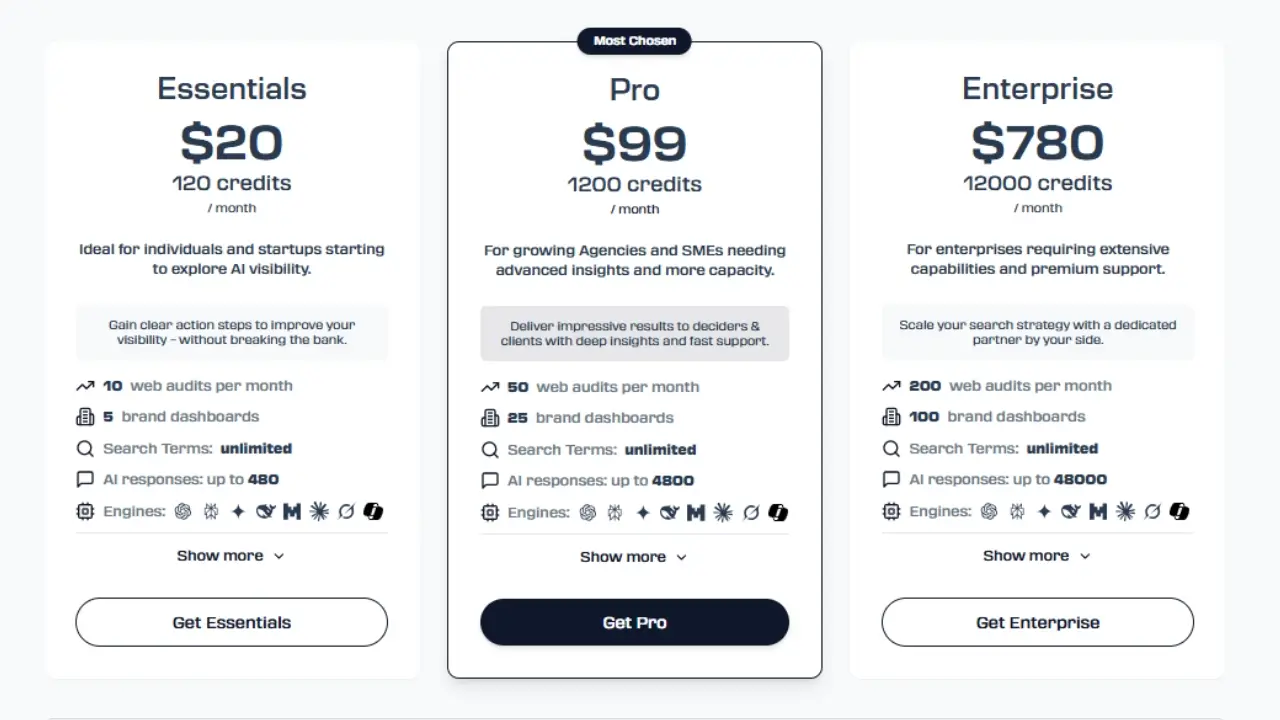
Verdict ⭐
SERanking remains a solid pick for SEO-first teams who want visibility in Google AI Overviews but aren’t ready to fully embrace multi-platform AEO. However, its narrow coverage, lack of guidance, and high pricing make it less competitive in today’s AI-driven ecosystem.
ROI Potential: Low-to-moderate, unless your strategy is almost entirely Google-focused.
ROI Rating: ★★☆☆☆ (2.5/5)
Overall Rating: ⭐⭐☆ (2/5)
RankScale — The GDPR-Compliant Specialist
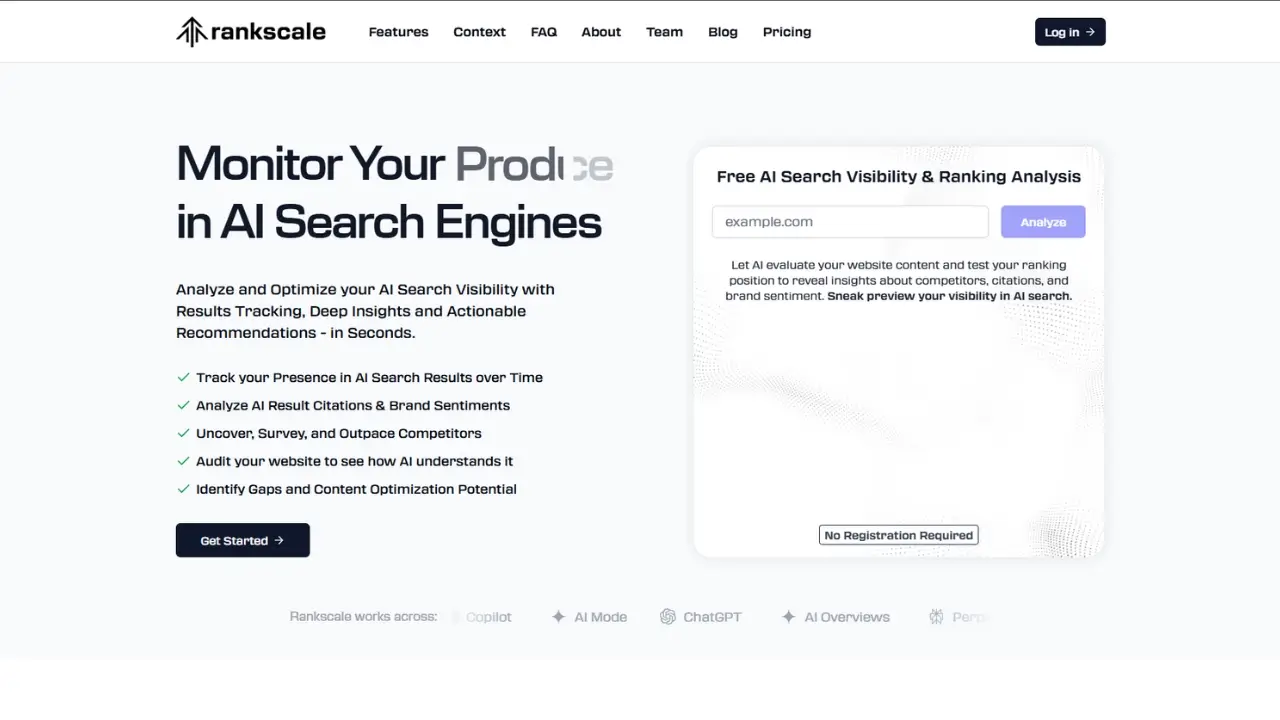
"Precision for EU Markets, but Limited for Global Players"
RankScale, based in Vienna, is an AEO (Answer Engine Optimization) tool purpose-built for Europe. With strict adherence to GDPR and the EU AI Act, it provides AI visibility insights that are safe, compliant, and regionally focused. While it’s a strong fit for EU-based brands, its limited global reach and slower update cycles restrict its appeal for international campaigns.
Best For
- EU-based SMEs needing GDPR-compliant AI insights
- Brands targeting regional European markets under strict data privacy laws
Key Features
- AI Search Audits
Evaluates authority, content relevance, and technical SEO for AI-driven engines. - Competitor Benchmarking
Tracks visibility against competitors across ChatGPT, Gemini, and Perplexity. - Citation Tracking
Identifies which sources influence AI-generated answers, with emphasis on EU-preferred domains (.eu, .de, .fr, etc.). - SEMrush Integration
Connects traditional SEO data with AI search visibility for a hybrid perspective.
Pros & Cons
| Pros ✅ | Cons ❌ |
|---|---|
|
|
Pros ✅
Cons ❌
Pricing
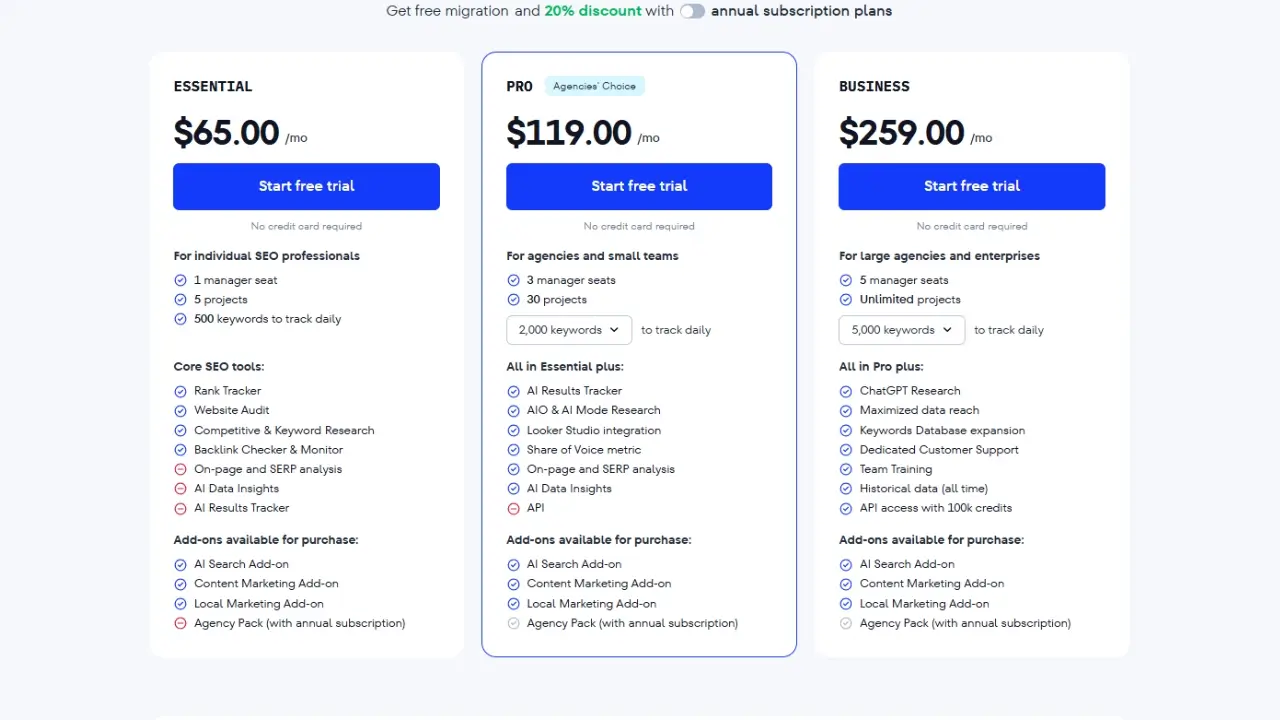
Verdict ⭐
RankScale is an excellent niche tool for EU-focused campaigns, combining compliance-first insights with practical SEO-AEO bridges. But for global brands, its narrow coverage and delayed reporting make it less competitive.
ROI Potential: High for EU campaigns, low for global scalability.
ROI Rating: ★★★☆☆ (3/5)
Overall Rating: ⭐⭐⭐ (3/5)
BrandRank.ai — The Trust Architect
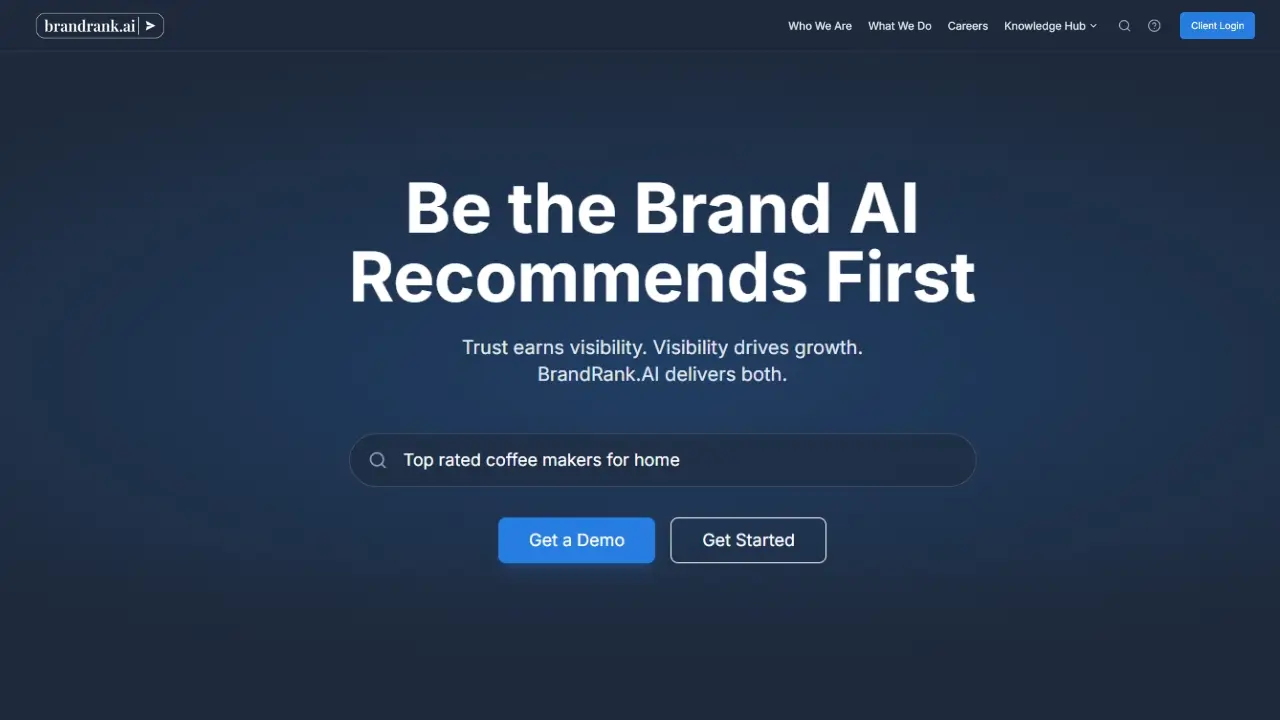
"Where AI Transparency Meets Brand Integrity"
BrandRank.ai, headquartered in Cincinnati, Ohio, is a reputation-focused platform that monitors how brands appear in AI-generated answers across search and answer engines. Trusted by Nestlé and the Better Business Bureau (BBB), it blends AI monitoring with human oversight, making it especially valuable in industries where trust and compliance are non-negotiable.
Best For
- Fortune 500 enterprises needing high-stakes brand protection
- Regulated industries (finance, healthcare, sustainability)
- Brands prioritizing trust in AI-generated responses
Key Features
- AI Search Audits
Evaluates visibility, vulnerability, and readiness in AI-driven contexts. - Competitor Benchmarking
Compares your brand’s presence against industry rivals across AI platforms. - BBB Partnership Integration
Uses Better Business Bureau trust data to strengthen credibility scoring. - Sustainability & Reputation Audits
Expands into niche areas like supply chain claims and sponsorship monitoring.
Pros & Cons
| Pros ✅ | Cons ❌ |
|---|---|
|
|
Pros ✅
Cons ❌
Pricing
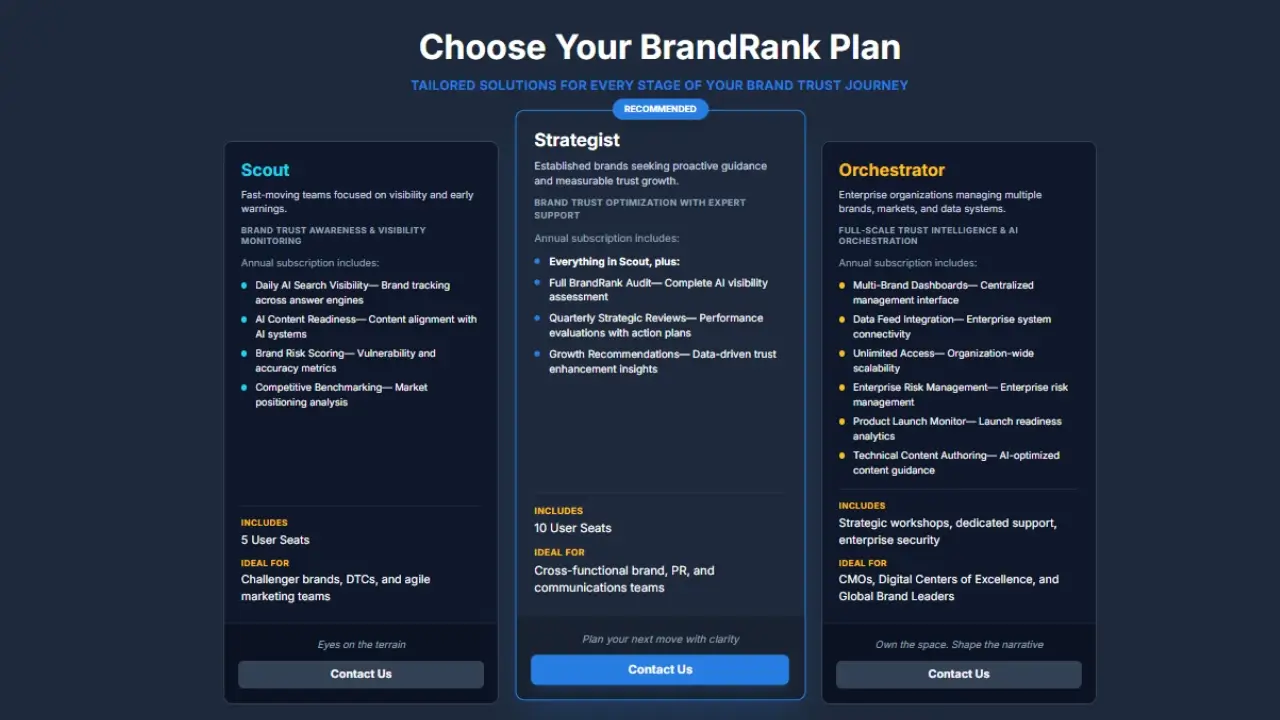
Verdict ⭐
BrandRank.ai is a top-tier choice for enterprise reputation management in the AI era. It’s built for organizations where trust is central to brand survival. While its credibility, compliance edge, and human validation stand out, its enterprise-only focus and lack of pricing transparency keep it out of reach for smaller brands.
ROI Potential: High for Fortune 500s and regulated industries.
ROI Rating:★★★★☆ (4/5)
Overall Rating: ⭐⭐⭐⭐ (4/5)
Nightwatch — The SEO Tool in Disguise
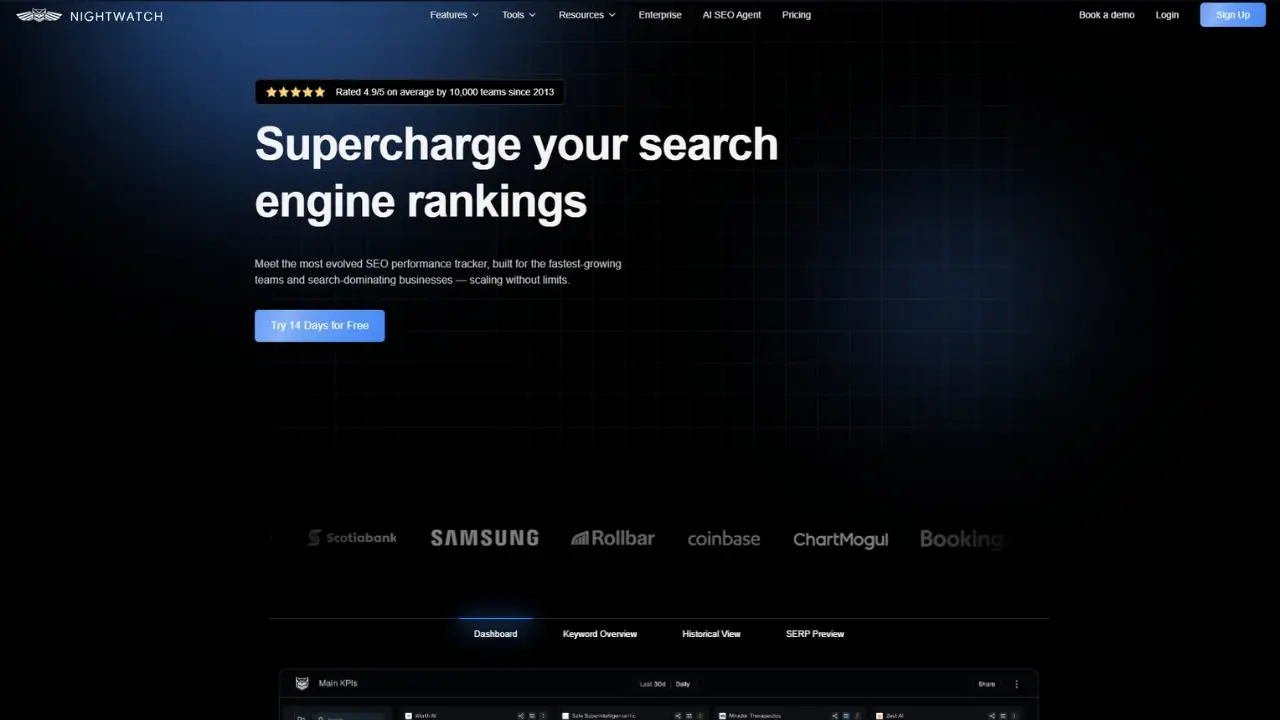
"A 2015 SEO Tool Pretending to Be AEO-Ready"
Nightwatch is a platform that still operates with the mindset of classic SEO, despite marketing itself as an AI-era solution. Originally designed for rank tracking and backlink monitoring, it has added little to adapt to the rise of Answer Engine Optimization (AEO). For users who want to understand how their brand appears in ChatGPT, Bing AI, Claude, or Perplexity, Nightwatch offers no answers.
Instead, the tool focuses narrowly on Google keyword tracking and legacy backlink metrics, making it feel more like a repackaged SEO dashboard than a true AEO platform. While its clean interface and affordable plans might appeal to beginners, it misses the critical features needed for visibility in AI-driven search ecosystems.
Best For
- SEO purists still focused exclusively on Google rankings and organic traffic
- Budget-conscious startups experimenting with SEO, without immediate AI visibility goals
- Teams that want simplicity over sophistication, even if it means missing modern AEO insights
Key Features
- Keyword Tracking
Monitors Google keyword rankings, but has no capability for AI-generated answers. - Backlink Alerts
Tracks backlinks that once mattered for SEO dominance, but carry less weight in today’s AI-first search results. - Historical Data
Offers long-term performance graphs, but mostly around keyword rank movements rather than AI presence. - Google Search Console Integration
Integrates with GSC to provide keyword and site performance data, useful for old-school SEO workflows.
Pros & Cons
| Pros ✅ | Cons ❌ |
|---|---|
|
|
Pros ✅
Cons ❌
Pricing
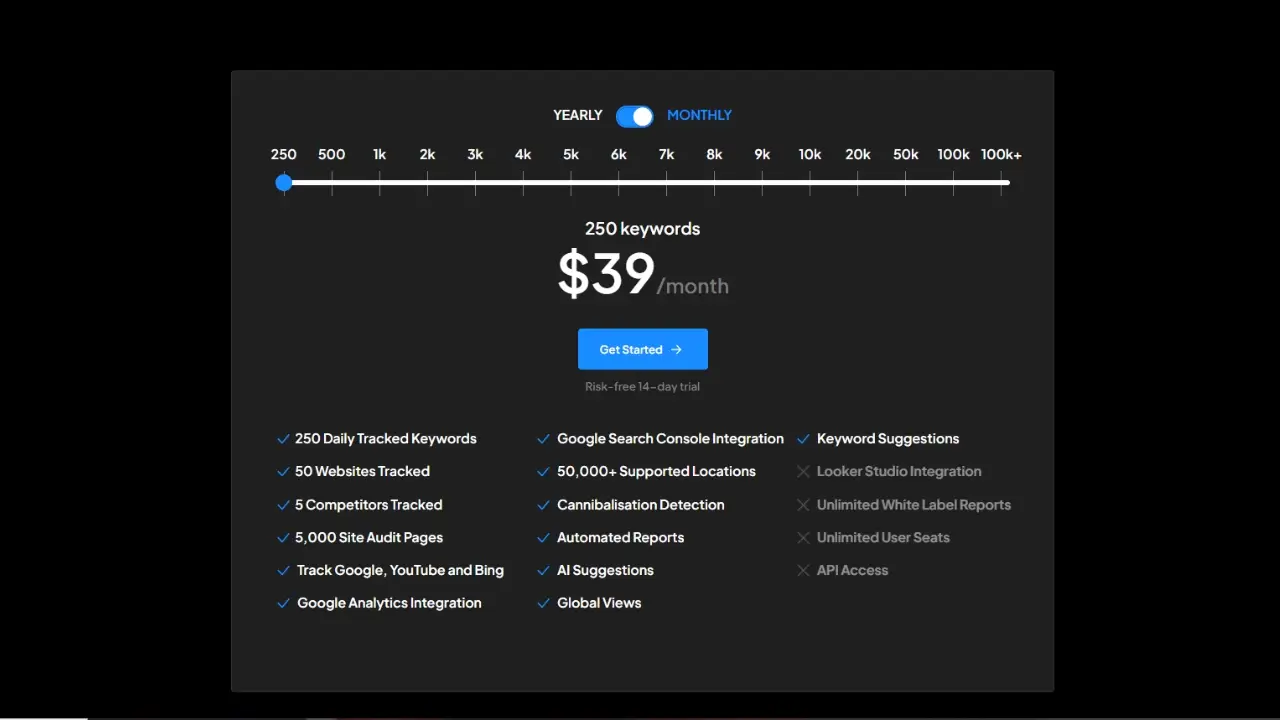
Verdict ⭐
Nightwatch is like bringing a flip phone to a 5G era functional in some ways, but hopelessly behind the times. For users who simply want a cheap, lightweight SEO tracker, it gets the job done. But for anyone serious about competing in the AI-first search ecosystem, it provides no meaningful value.
It’s best described as an SEO tool with an AEO sticker slapped on top appealing for nostalgia, not for the future.
ROI Potential: Low, except for small teams sticking to SEO basics.
ROI Rating: ★★☆☆☆ (2/5)
Overall Rating: ⭐⭐ (2/5)
Ziptie.dev — The Developer’s Only Friend
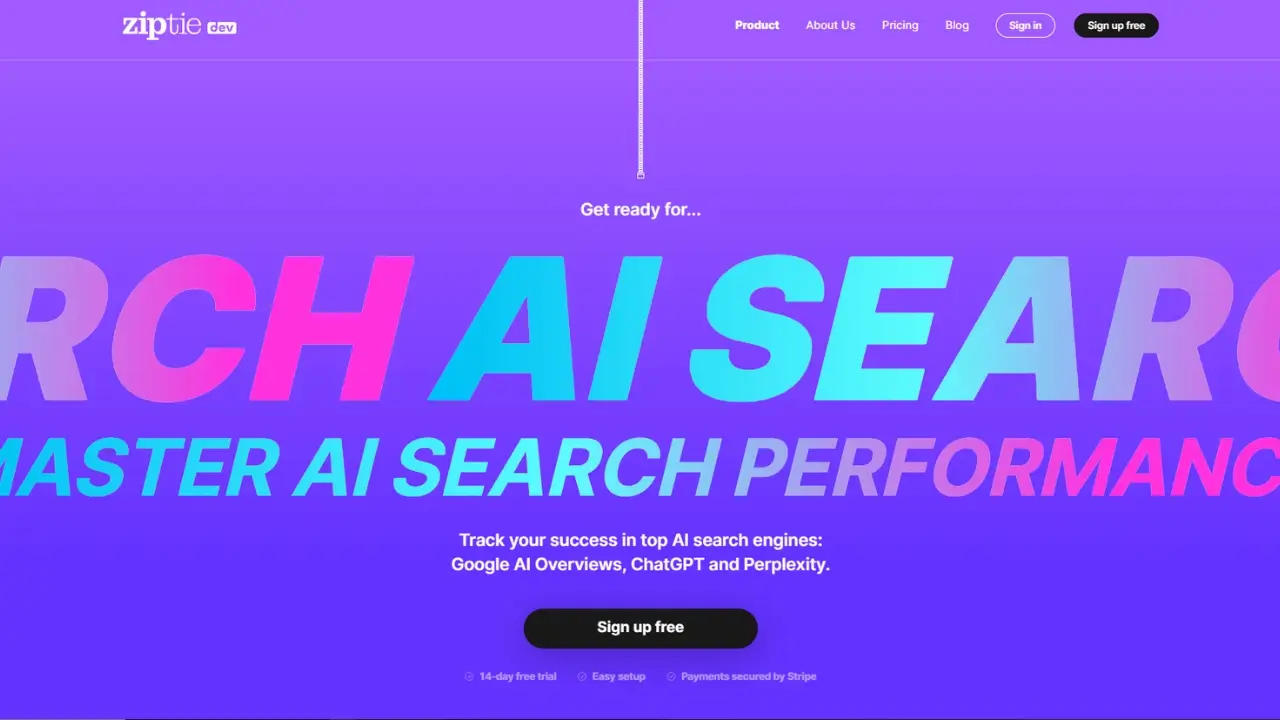
"For Coders Who Think GUIs Are Overrated"
Ziptie.dev is an API-first AEO tool that unapologetically caters to engineers rather than marketers. Forget drag-and-drop dashboards or sleek interfaces, this platform is all about raw data, custom scripts, and automation through code. If you’re comfortable living in terminal windows, Ziptie.dev can unlock immense control and scalability. If not, prepare for a frustrating experience.
Where most AEO tools are built to simplify monitoring brand presence across AI platforms, Ziptie.dev takes the opposite route: it hands you data firehoses in CSVs and JSON and expects you to mold them into insights. This makes it perfect for DevOps teams, data engineers, or technical founders who want full flexibility to build their own pipelines but nearly unusable for marketers or non-technical teams.
Best For
- DevOps & Data Engineering Teams building custom AEO pipelines
- Startups led by technical founders (CTOs/engineer-CEOs) who want maximum control
- Enterprises needing scalability and custom integrations beyond what out-of-the-box AEO dashboards can offer
Key Features
- API-First Design
Automate AEO tracking and connect with your own systems, but only if you can code it yourself. - Raw Data Dumps
Provides massive CSVs and JSON datasets, often so largethat Excel can’t open them. Great for data scientists, less so for casual users. - Custom Alerts
Webhook triggers for AI mentions across ChatGPT, Claude, Bing AI, and more but setup requires scripting and trial-and-error. - Unlimited Integrations
Because everything runs through APIs, you can plug it into data warehouses, custom dashboards, or monitoring systems.
Pros & Cons
| Pros ✅ | Cons ❌ |
|---|---|
|
|
Pros ✅
Cons ❌
Pricing
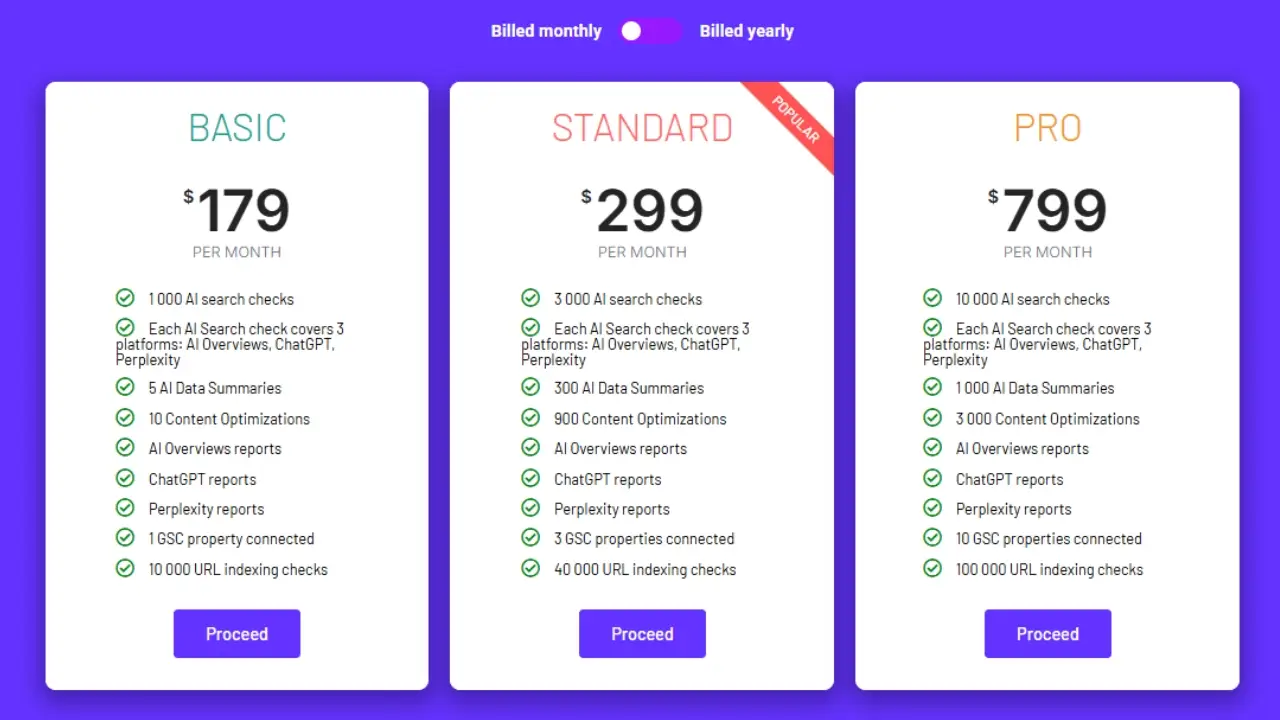
Verdict ⭐
Ziptie.dev is not for the faint of heart. It’s a tool that demands technical skill, patience, and coding confidence. For developers and data engineers, it can be a dream platform, enabling extreme customization and integration. For marketers or agencies looking for plug-and-play AEO insights, however, it’s a nightmare.
It’s best described as “AWS for AEO”, powerful, but only if you know how to wield it. If your team thrives in code, Ziptie.dev gives you limitless potential. If not, you’ll burn money and time on a tool you can’t fully use.
ROI Potential: Very High (for technical teams) / Very Low (for non-technical teams)
ROI Rating: ★★★☆☆ (3/5)
Overall Rating: ⭐⭐⭐ (3/5)
Key Takeaways: Why AEO Tools Define the Future of Search
AEO Tools Are Non-Negotiable
According to Google (2024), AI Overviews and ChatGPT influence 43% of purchase decisions. That means nearly half of all buying intent is already shaped before users click a traditional blue link. Brands that ignore Answer Engine Optimization tools risk becoming invisible as AI answers increasingly dominate the buyer journey.
Match Tools to Your Battlefield
Every business stage demands the right AEO arsenal:
- Startups & SMBs → Leverage AI Monitor for ROI-focused tracking or Otterly.AI for cost-effective visibility.
- Global Enterprises → Deploy Profound for predictive analytics or BrandRank.ai for real-time crisis monitoring.
- EU Compliance Teams → Rely on RankScale with its GDPR-first architecture.
The winning formula: choose tools aligned with your market size, compliance needs, and growth stage.
Ease of Use Doesn’t Mean Sacrificing Depth
Legacy SEO platforms (like Semrush) are user-friendly but lack AEO-specific insights, things like AI prompt volume tracking, conversational mentions, and AI Overview visibility. Modern tools strike the balance: simple dashboards with deep, AI-native analytics.
The Reality Check
This isn’t about chasing hype, it’s about brand survival. With 40% of Google queries now answered inside AI Overviews and ChatGPT becoming the “homepage” for Gen Z, AEO is no longer optional. The brands winning tomorrow are already investing today.
Your AEO Playbook 🚀
- 1. Start with AI Monitor → Establish AI visibility with cross-platform tracking + actionable insights.
- 2. Scale with Profound or BrandRank.ai → Unlock enterprise-grade predictive analytics and brand defense.
- Cut Legacy SEO Tools → Retire outdated platforms like Nightwatch that don’t account for AI-driven search.
Bottom Line: To stay relevant in 2025, you must be answer-ready, not just search-ready.



